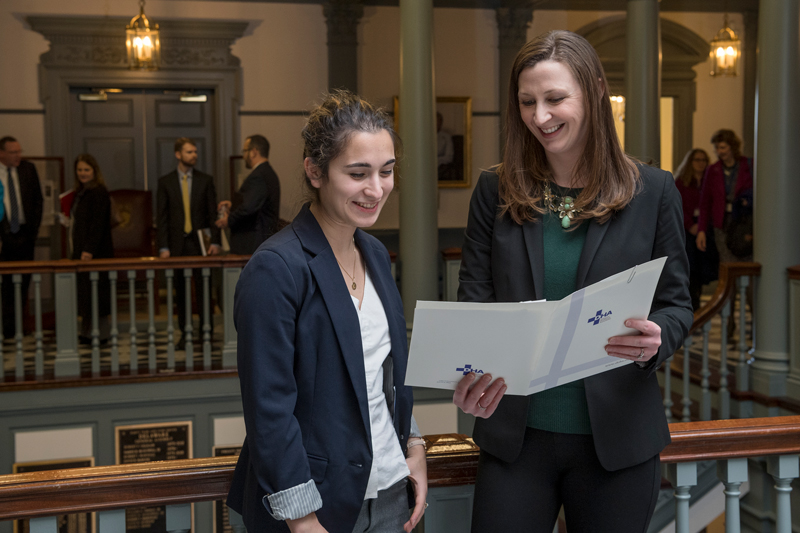


Learning healthcare policy
Photos by Kathy F. Atkinson February 20, 2020
UD student Graciela Rayome’s internships help her plot a professional path
On a recent afternoon, 21-year-old Graciela Rayome pulled on her best navy blue blazer and entered Dover’s stately Legislative Hall. In a leather chair on the second floor, under the watchful eye of long-deceased governors and military heroes depicted on the walls, she sat surrounded by politicians and lobbyists 30 years her senior.
“I’m not intimidated because I know at least the pages are younger than me,” she said, referencing the teenaged Senate helpers. “I’m just excited to see the political cogs turning in real time.”
A senior public policy major at the University of Delaware, Rayome is also an Undergraduate Public Administration Fellow. Translation: She’s been accepted into a competitive program that, outside of regular coursework, requires building knowledge that will improve lives in Delaware and beyond. In Rayome’s case, this means serving as a research intern for the Delaware Healthcare Association. According to its website, DHA is a statewide trade and membership services organization that exists to represent and serve hospitals, health systems, and related healthcare organizations in their role of providing a continuum of appropriate, cost-effective, quality care to the people of Delaware. In her role, Rayome’s tasks include legislative tracking, hence her presence at the state house on this day. On the agenda? Monitoring Senate discussion about a bill meant to improve outcomes for mothers and newborn babies in Delaware.
“She’s doing graduate-level work,” said Christina Crooks Bryan, director of communications and policy at the DHA and a 2006 graduate of UD’s political science program. “At a time when there is so much change and innovation happening in healthcare, it’s been wonderful to have the perspective of an enthusiastic young person.”

Rayome’s interest in the field can be traced to her childhood when, at age 9, she was diagnosed with Type 1 diabetes. This marked the beginning of a long, intimate relationship with the American healthcare system.
“I’ve been in and out of hospitals my whole life, so I know the strengths and weaknesses from a patient perspective,” said Rayome, a member of the College Diabetes Network support group at UD. “I’ve seen devoted nurses and doctors taking so much time to interact with me and determine the care I need. I’ve also had negative experiences, where I’ve witnessed mismanagement of care and a lack of communication and coordination.”
One such experience happened during Rayome’s first year at UD. Having left her home state of Tennessee to attend the university, she was coping with a lot of change, and her diabetes management, she said, “went off the rails.” Proper management includes taking insulin to control blood sugar. (A typical body’s pancreas produces the right amount of insulin for whatever a person eats.) She entered a state of ketoacidosis, a condition in which the body breaks down fat too quickly producing a buildup of acids in the bloodstream called ketones. Untreated diabetic ketoacidosis can be fatal, according to the Mayo Clinic.
“In the emergency department, I felt like another number,” Rayome said. “And I don’t think they looked at my file too closely, because they took me off insulin. I ended up in the ICU, where I began hallucinating.”
Fortunately, after three days and some course correction from the hospital, Rayome recovered enough to go home. But her medical woes were made all the more burdensome the following year when her father lost his job and, with it, the family’s health insurance.
“I’d always had trouble finding places that would accept it, anyway,” she said of the family’s health insurance plan. “And now I’m in health-insurance limbo. It’s such a hassle. But it made me realize: Something needs to change.”
Enter Raymoe’s internship at the DHA, which she hopes will kickstart a lobbying career devoted to identifying and eliminating systemic problems within the healthcare industry. So far, in addition to her work monitoring the progress of healthcare legislation, she’s completed several important projects. Among them is a policy brief — something she learned to write during her Public Policy Analysis Class at UD — on Delaware’s Certificate of Need program.
There’s been much chatter about the efficacy of this program, which requires hospitals to provide extensive regulatory documentation — or paperwork overkill, depending on your point of view — when applying for extra facilities or equipment. To get to the bottom of the debate, Rayome spent last summer comparing Delaware’s certificate-of-need guidelines with those in other states. Her final report helped a steering committee comprising policy managers from each hospital in Delaware come to their decision: The state’s program doesn't need to be abolished entirely, but it could use some modifications to cut down on red tape.
Having such influence as a college student just getting her professional footing “is a little overwhelming,” Rayome said. “But the opportunity to have a real, tangible impact when doing research as an undergraduate is so rare, and I don’t take that lightly. I’m grateful.”
She is also passionate — when she goes on a tear about something healthcare related, her boyfriend sometimes has to stop her: “Gracie, I have no idea what you’re talking about.” And the more time she spends getting acquainted with the field, the more this passion grows.
“Like a lot of people, I worry a great deal about this whole healthcare situation,” Rayome said. “But — and this may sound weird — confronting the problems directly actually makes them less stressful. As a typical citizen, you don’t necessarily know what’s going on. But I get to see behind the curtain and know where things are in their development process. It lends a sense of control.”
This is part of the reason that, with her current internship coming to a close, Rayome is looking ahead to her next opportunity: interning in Washington, D.C., for Sen. Bob Casey of Pennsylvania, who serves on two committees related to healthcare access.
Casey is especially focused on reversing the opioid crisis, a cause that is close to Rayome’s heart. During a recent summer break, she worked in the psychiatric ward of a hospital in Tennessee, where she experienced first hand the realities of the epidemic. Then, in her role at the DHA, she was able to assist with planning for the Delaware Goes Purple project, an initiative of the Sussex County Healthcare Coalition meant to reduce stigma surrounding opioid addiction.
It’s one of many recent projects, Rayome said, that’s bolstered her sense of hope.
“There’s a persistent healthcare narrative in this country that everything is getting worse and nothing is getting better,” she said, moments before entering the Senate chambers. “But I’ve learned there’s a lot of good people working behind the scenes — slowly but tirelessly — to make healthcare less exhausting and more accessible. They’re making the world a better place. So, when you’re feeling discouraged, remember them.”
Institute for Public Administration
The Public Administration Fellow program is run by the Institute for Public Administration in the Biden School of Public Policy and Administration.
Contact Us
Have a UDaily story idea?
Contact us at ocm@udel.edu
Members of the press
Contact us at 302-831-NEWS or visit the Media Relations website

